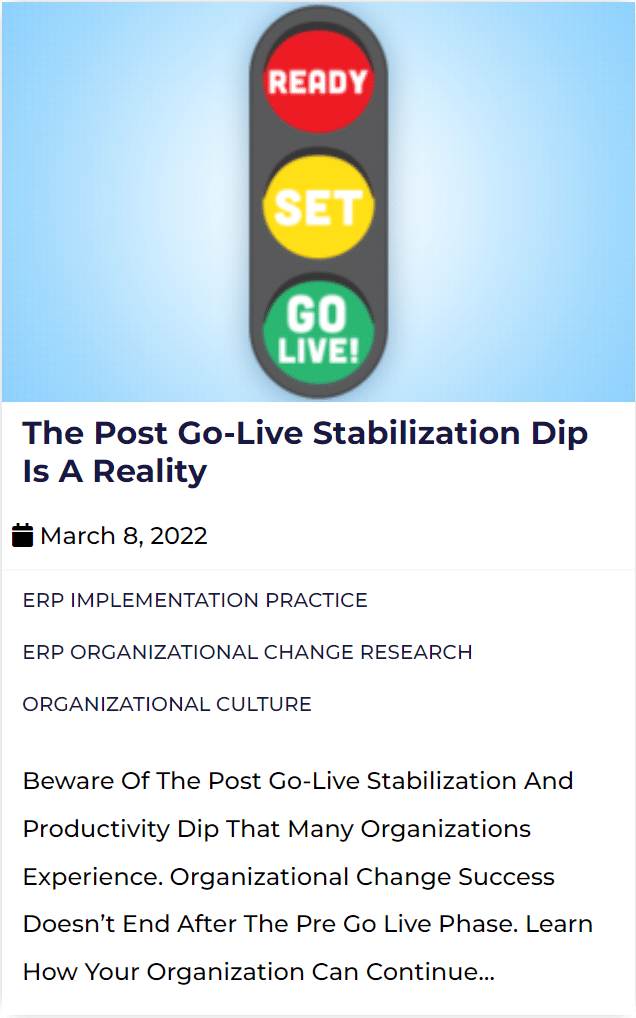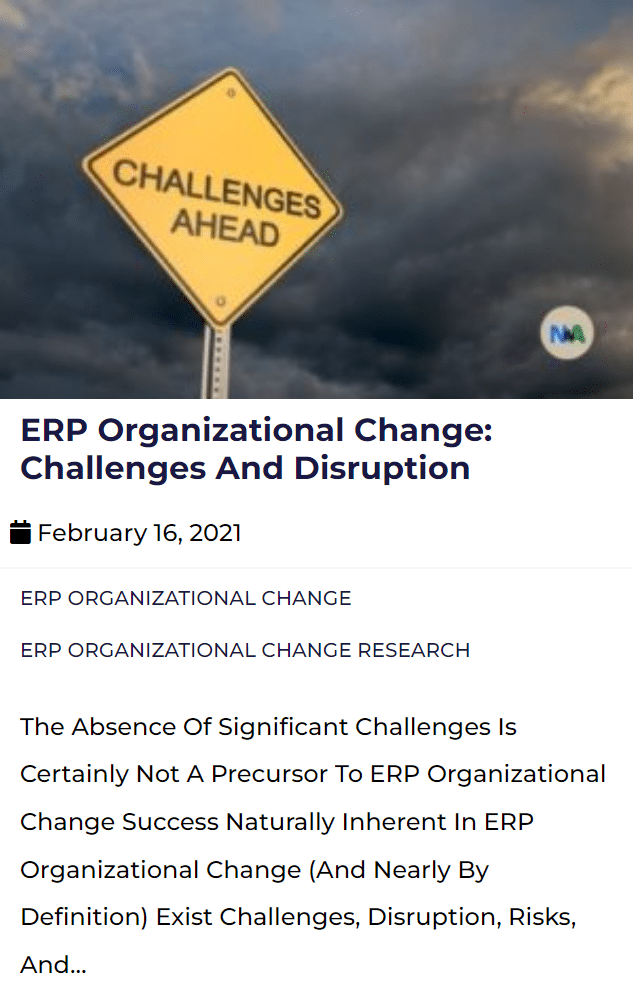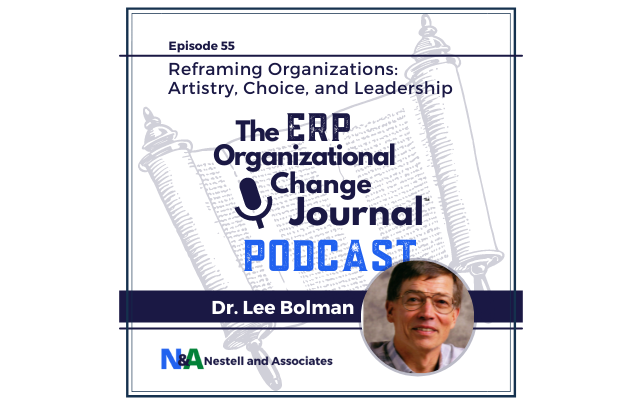Organizational learning comes in different forms which include reflection, sharing experiences, and formal training.
Article Contents
- Effective Learning Through Effective Education
- Effective Learning Through Scaffolding
- Effective Learning Through Purposeful, Structured, and Formal Organizational Training
- Effective Learning Through Transfer of Training Knowledge
- Effective Learning Through Evaluation and Measurement
- Effective Learning Endorsed Through Organizational Culture
- Effective Learning Through Effective Practice
Effective Learning Through Effective Education
Organizational learning and education play a crucial role in organizational learning for ERP Success. Dr. Richard E. Snow, in his article “Aptitude Development and Education” (1996, p. 537), asserts that the main objective of education is to cultivate the ability to learn, reason, solve problems, stay engaged and perseverant, and adapt in the face of novelty, complexity, adversity, and change. Ultimately, it aims to develop readiness and aptitude for continuous and effective corporate learning.
“learning to learn, learning to reason, learning to find and solve problems, learning to be interested and industrious, to persevere, to achieve in the face of novelty, complexity, adversity, and change—in short, to develop readiness, that is, aptitude, for new learning—increasingly becomes the principal goal of education“.
Indeed, this concept holds true for ERP organizational change, as well. Organizational learning encompasses various forms, such as reflection, experience sharing, and formal training. Corporate learning, in particular, focuses on fostering a culture that promotes the continuous improvement of employees’ skills and knowledge. Furthermore, effective education rooted in sound principles supports and promotes organizational learning. Dr. Snow emphasizes that readiness and learning are integral factors influencing the success of ERP organizational change.
Effective Learning Through Scaffolding
“Although education is a corner-stone of ERP implementation, the user training is usually only emphasized and the courses are centered on computer/system operation rather than on understanding the ERP concept and spirit.” (Yu, C. S.,2013, Causes influencing the effectiveness of the post‐implementation ERP system).
To achieve success in ERP organizational change, organizations must cultivate learning in both functional knowledge and the essence of ERP.
A strategic and intentional approach to ERP organizational change education and training is essential, incorporating scaffolding to bolster organizational ERP learning. This method guides employees toward an increasingly refined understanding of ERP organizational change and the conceptual, functional, and process support values offered by ERP systems. It is vital for employees to progress from a general to a more detailed comprehension of the ERP organizational change process and the ERP platform.
This learning journey should encompass organizational readiness and preparation, ERP conceptual and general understanding, specific ERP functional training, hands-on labs and assignments, conference room piloting (CRP), and user acceptance testing (UATs).
Effective Learning Through Purposeful, Structured, and Formal Organizational Training
The ERP implementation process heavily relies on end-user education and training. Numerous resources, such as Vincent, Soni, & Venkat (2018), Noudoostbeni, Ismail, Jenatabadi, & Yasin (2018), and Momoh, Roy, & Shehab (2013), emphasize that proper training is a critical success factor and a common challenge for organizations. Successful ERP implementations necessitate a purposeful, structured, and disciplined approach to organizational training and education.
Organizations often concentrate on technology stacks, business processes, and functional requirements, all of which are crucial, but neglect to allocate sufficient attention to functional and conceptual end-user training. When training is considered, organizations may not allow adequate time for its execution. Expecting too much from end-users in a short period can be unrealistic, as adopting a new ERP solution typically involves a steep learning curve.
As part of formal training, ERP users must also gain insight into the “upstream” and “downstream” implications of business processes. In other words, they need to comprehend the origins and destinations of their data and the impact of their process execution on the organization as a whole. Additionally, employees should be equipped to identify and resolve issues, such as errors, transaction failures, or missing data. ERP functional training and corporate learning should become ingrained in users’ muscle memory so that it feels like second nature by the time of go-live, ensuring the success of Organizational Learning in ERP.
Effective Learning Through Transfer of Training Knowledge
Participating in formal training, conference room pilots (CRPs), and User Acceptance Testing (UATs) in a structured environment is one aspect of the learning process, but applying the newly acquired skills in the “real world” after the organization goes live with a new ERP solution is another challenge altogether. A smooth go-live event and post-go-live transition depend on end-users feeling comfortable with the new ERP system. However, simply executing functional work instructions in a classroom setting is insufficient.
Effective learning and continuous improvement must continue well beyond the go-live phase. Organizations should provide ongoing training and opportunities for discussing the transfer of knowledge from the classroom to operations. Key questions to address include: What is working well? What needs improvement? What issues are arising? As knowledge transitions from the classroom to real-world applications, significant learning opportunities emerge.
Organizational learning is not limited to classroom events. It is crucial for organizations to allocate proper resources that facilitate the effective and efficient transfer of knowledge from the classroom to operations, ensuring that this process supports the desired business outcomes, such as successful ERP organizational change.
Effective Learning Through Evaluation and Measurement
Training is an aspect of ERP organizational change that can be measured. While ERP organizational change practitioners may agree on the value of organizational learning in concept, it is crucial for your ERP organizational change plan to include specific, measurable actions that support, promote, and improve organizational learning. A key objective of any ERP organizational change plan should be a comprehensive plan to implement, manage, and monitor desired performance outcomes.
The New World Kirkpatrick Model
One framework for designing an integrated training implementation and evaluation plan is the New World Kirkpatrick Model (Kirkpatrick & Kirkpatrick, 2016), which consists of four levels of monitoring and evaluation:
- Level 1 – Reaction: Assessing the extent to which stakeholders find training engaging and relevant.
- Level 2 – Learning: Measuring the degree to which stakeholders acquire the necessary knowledge, skills, attitude, confidence, and commitment.
- Level 3 – Behavior: Evaluating the extent to which stakeholders apply and transfer their learning to practice.
- Level 4 – Results: Examining whether organizational goals and desired outcomes are met.
Effective Implementation Criteria
To effectively implement the New World Kirkpatrick Model, two criteria must be met:
- The model should be implemented in a way that promotes training and evaluation relevant to organizational decision-making (Kirkpatrick & Kirkpatrick, 2016).
- It must be credible, believable, and grounded in reality (Kirkpatrick & Kirkpatrick, 2016).
By utilizing the New World Kirkpatrick Model, the implementation and evaluation plan can facilitate organizational alignment from higher-level goals to the initial stages of a training and implementation program, which begins with commitment, engagement, and buy-in from organizational stakeholders.
Effective Learning Endorsed Through Organizational Culture
A culture of organizational learning is crucial during the significant learning curve often experienced by organizations during ERP implementation. By capitalizing on errors, mistakes, and lessons learned, a learning culture supports organizations through the substantial changes in process, people, and technology that accompany ERP implementation.
Organizational Learning as a Success Factor and Continuous Improvement Tool
Organizational learning is not only a significant factor in ERP success, but it also serves as a tool for continuous improvement. Various studies highlight the importance of learning, support, and collaboration in ERP organizational change:
- Ke and Wei (2008) emphasize the dependency of ERP organizational change on learning, support, and collaboration.
- Scott and Vessey (2018) discuss the role of learning from failure during ERP organizational change, stating that organizational learning is positively associated with improvement, development, and ultimately, success.
- Shao, Feng, and Hu (2017) explain that an organizational learning culture directly impacts ERP organizational change success.
- Park, Suh, and Yang (2007) suggest that a major influence on ERP success is understanding, assimilating, and applying ERP knowledge, which comes through knowledge sharing and organizational learning.
Intentional Learning from Challenges
Since ERP organizational change risks and challenges are to be expected, even with the best of efforts, it is essential to intentionally learn from these challenges. Implementing mechanisms to ensure learning takes place starts with an organizational culture that values and endorses corporate learning.
Effective Learning Through Effective Practice
Scott and Vessey (2018) suggest that organizational learning (and learning from failure) is essential for ERP organizational change success. They provide several insights that can be useful for practitioners implementing ERP systems or any other far-reaching, integrated systems. Here are some of their key points for practice that endorse organizational learning:
- Realistic View of Technology’s Role: Understand the role technology can play in supporting your firm’s strategy; engage in a strategy of “small wins” or “small failures” to leverage the knowledge gained.
- Strong Project Planning and Management: Employ a strong project leader and a well-defined methodology to address changes during the project appropriately; ensure the effectiveness of high-level planning and management, even if there is insufficient knowledge to manage at the tactical level.
- Adaptability in Unforeseen Circumstances: Be flexible in adapting to changes in the business environment by adjusting at the project level; consider deferring the Go Live date, reducing project scope, changing team composition, organizing training, and creating think tanks.
- Importance of Organizational Culture: Recognize the value of an open culture and encourage open communication to facilitate organizational learning.
- Phased or Roll-out Strategy: Consider using a phased or roll-out strategy to facilitate organizational learning and provide the opportunity for learning from (small) failures.
In conclusion
This article has delved into diverse facets of Organizational Learning in ERP and its vital role in realizing ERP organizational change success. By integrating effective corporate learning, scaffolding, structured and formal training, transferring training knowledge, evaluation and measurement, nurturing a learning culture, and encouraging effective practice, organizations can overcome the challenges and learning curves linked to ERP implementation. This all-encompassing approach to learning fosters ongoing improvement and development, ultimately contributing to organizational success. Keep in mind, a well-rounded ERP organizational change plan should encompass concrete, tangible, and quantifiable actions that support, advocate, and enhance organizational learning based on solid principles.
Dr. Jack G. Nestell
Is your organization embarking on an ERP implementation journey or seeking to improve your current ERP system?
Our team of experts is ready to help. We can guide you through the process, providing tailored support and strategies to enhance organizational learning and ensure a successful ERP organizational change. Let’s take the first step toward a brighter future for your organization!
Referrences
- Dr. Richard E. Snow (1996). Aptitude Development and Education. Psychology, Public Policy, and Law, 2(2), 536-560.
- Yu, C. S. (2013). Causes influencing the effectiveness of the post‐implementation ERP system. Industrial Management & Data Systems, 113(3), 324-341.
- Vincent, A., Soni, A., & Venkat, R. (2018). Impact of user personality traits on ERP implementation success: An empirical study of Indian organizations. Journal of Enterprise Information Management, 31(5), 736-760.
- Noudoostbeni, A., Ismail, W. K. W., Jenatabadi, H. S., & Yasin, N. M. (2018). Human resource role in enterprise resource planning system implementation: a theoretical perspective. International Journal of Economics and Management, 12(2), 659-675.
- Momoh, A., Roy, R., & Shehab, E. (2013). The effects of human factors on the use of enterprise resource planning (ERP) system in Nigeria. International Journal of Information Systems and Change Management, 6(3), 267-288.
- Kirkpatrick, J. D., & Kirkpatrick, W. K. (2016). Kirkpatrick’s Four Levels of Training Evaluation. Association for Talent Development.
- Ke, W., & Wei, K. K. (2008). Organizational culture and leadership in ERP implementation. Decision Support Systems, 45(2), 208-218.
- Scott, J. E., & Vessey, I. (2018). Managing risks in enterprise systems implementations. Communications of the ACM, 61(4), 154-163.
- Shao, Z., Feng, Y., & Hu, Q. (2017). Impact of organizational culture and computer self-efficacy on knowledge sharing. Industrial Management & Data Systems, 117(6), 1053-1071.
- Park, J. H., Suh, H. J., & Yang, H. D. (2007). Perceived absorptive capacity of individual users in performance of enterprise resource planning (ERP) usage: The case for Korean firms. Information & Management, 44(3), 300-312.
Related Articles
Related Podcasts
Episode 55: Reframing Organizations: Artistry, Choice, and Leadership
In this episode, we discuss “Reframing Organizations” with Dr. Lee Bolman. Dr. Bolman and his colleague, Dr. Terrence E. Deal, are co-authors of “Reframing Organizations: Artistry, Choice, and Leadership”, the topic of this episode.
More Related Podcasts
About Nestell & Associates
Where People, Processes, and Technology Align
Nestell & Associates is a strategy and management firm. We can help you take your portfolio companies to the next level by demonstrating how to execute a scalable, methodical, and disciplined approach to ERP Organizational Change and Digital Transformation success.





